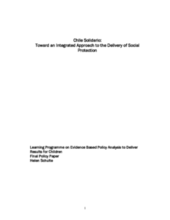Building and strengthening social protection systems is emerging as a priority for Governments, donors, UN agencies and NGO partners. Long considered a privilege of developed countries, social protection is now recognized for the role it plays in addressing poverty and vulnerability in developing countries, especially among marginalized and socially excluded groups.
Social Protection is a set of “(…) public interventions to (i) assist individuals, households, and communities better manage risk, and (ii) provide support to the critically poor.” In principle, many key players in the social protection arena accept this (or similar) broad definitions. In practice, however, there has been tendency to focus on risks related to income poverty, with social protection strategies in most regions predominantly centering on measures to provide the poor with income support through social transfers.
The focus on measures to promote household economic security is reflected in the existing body of social protection research. There is no shortage of studies and evaluations on the impact of social transfers on human capital development, and on their operation and design. Very little attention, however, is paid to the question of how to integrate these schemes into an overall package of expanded social protection that works on both the demand and supply side to have maximum effect.
This paper argues that the implementation of social transfers alone will not bring us any nearer to the long-term goal of breaking with patterns of inter-generational transmission of poverty and exclusion. Rather than examining cash transfers in isolation, the focus of policy makers and researchers should be on their successful articulation within broader social protection policies. It will take an integrated approach – where social transfers are delivered in conjunction with social welfare services - to simultaneously address the multiple structural constraints that jointly lock the poor into indigence.
The paper will support this argument by way of discussing a concrete example of a policy intervention that is based on an integrated, systemic approach to poverty reduction and that combines cash support with social welfare services to facilitate poor households’ access to social services. The programme to be examined, Chile Solidario, was created in 2002 by the Chilean Government in response to a setback in the country’s efforts to eradicate extreme poverty. The paper will discuss both the programme’s design, as well as its impact to date.
It will be argued that Chile Solidario provides important lessons learned for the design of other social protection programmes, particularly with regard to: a) its focus on facilitating access, i.e. its use of a psycho-social support service as the means to connect poor families with the existing network of public assistance programmes and social services, thus enhancing their benefits; b) its operationalization of a multi-dimensional concept of poverty: Chile Solidario is not just about increasing participating families’ income, but works to overcome barriers to their well-being in several other dimensions, including education, family dynamics, and protection; and c) its attempt to match interventions on the demand side with a reorganization of the supply side to meet the needs of families participating in the programme.

